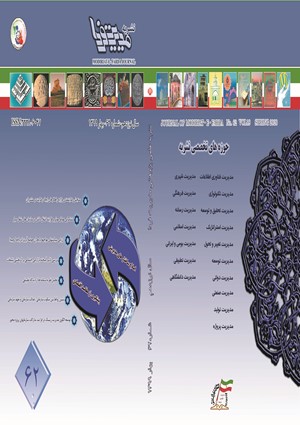The Roles of Technological Entrepreneurs in Technological Entrepreneurship Ecosystem
Subject Areas : مدیریت تکنولوژیAmirMahdi Maysami 1 * , Ghanbar Mohammadi Elyasi 2 , Seyyed Reza Hejazi 3 , Ali Mobini Dehkordi 4
1 - University of Tehran
2 - University of Tehran
3 -
4 - University of Tehran
Abstract :
Technological entrepreneurship ecosystem (TEE) is comprised of various elements and complex relations that all interact with each other to enable the creation and growth of technological entrepreneurship. The technological entrepreneur, as the main constituent of this ecosystem, should possess specific characteristics and also must perform particular roles. Despite the importance of (tech) entrepreneur in the (technological) entrepreneurship ecosystem, we are facing with the lack of comprehensive and robust literature in this domain. The aim of this research is to identify and explain various roles of tech-entrepreneurs in the relevant ecosystem. In this path, we adopted a constructivist approach of grounded theory, conducted in-depth interviews and analyzed secondary sources. Totally, we analyzed 27 cases of technological entrepreneurship process that ended in the identification of 14 specific roles in three groups. First, the principal roles which are research & development, market analysis, and resource mobilization. Second, the supporting roles such as networking, incident monitoring, and cooperation with technical experts. Third, the general (contextual) roles like building trust, and proper interactions with other elements of the ecosystem. These roles which based on their nature are in relation and interaction with other elements of the ecosystem, can enhance the related literature of entrepreneurship ecosystem and also lead the actions of technological entrepreneurs.
میثمی، ا. م.، محمدی الیاسی، ق.، مبینی دهکردی، ع.، و حجازی، س. ر. (1397). ابعاد و مولفههای اکوسیستم کارآفرینی فناورانه در ایران. فصلنامه مدیریت توسعه فناوری، 5(3)، 9–42.
Boutillier, S., Carré, D., & Levratto, N. (2016). Entrepreneurial Ecosystems (1st ed.). Hoboken, NJ, USA: John Wiley & Sons, Inc. https://doi.org/10.1002/9781119285175
Charmaz, K. (2006). Constructing Grounded Theory. London: SAGE Publications.
Creswell, J. W. (2012). Educational research: Planning, conducting, and evaluating quantitative and qualitative research (4th edition). Boston: Pearson Education.
Cross Border Virtual Incubator. (2013). Optimising the entrepreneurship ecosystem. Retrieved from https://eadtu.eu/images/publicaties/CBVI-Optimising_the_entrepreneurship_ecosystem.pdf
Feld, B. (2012). Startup communities: Building an Entrepreneurial Ecosystem in Your City. (B. Feld, Ed.). Hoboken, NJ, USA: John Wiley & Sons, Inc. https://doi.org/10.1002/9781119204459
Glaser, B., & Strauss, A. (1967). The discovery of grounded theory: strategies for qualitative research. London: Weidenfeld and Nicolson.
Gupta, R., Jain, K., Kusre, A., & Momaya, K. S. (2015). Technology Entrepreneurship Ecosystem in India : Findings from a Survey. Retrieved from https://www.pomsmeetings.org/confpapers/060/060-1492.pdf
Hoda, R., Noble, J., & Marshall, S. (2010). Using grounded theory to study the human aspects of software engineering. In Human Aspects of Software Engineering on - HAoSE ’10 (p. 1). New York, New York, USA: ACM Press. https://doi.org/10.1145/1938595.1938605
Hwang, W., & Horowitt, G. (2012). The Rainforest: the secret to building the next silicon valley. Los Altos Hills: Regenwald.
Isenberg, D. J. (2010). How To Start an Entrepreneurial Revolution. Harvard Business Review, (June), 12.
Isenberg, D. J. (2011). The Entrepreneurship Ecosystem Strategy as a New Paradigm for Economic Policy: Principles for Cultivating Entrepreneurships. The Babson Entrepreneurship Ecosystem Project. Retrieved from http://www.innovationamerica.us/images/stories/2011/The-entrepreneurship-ecosystem-strategy-for-economic-growth-policy-20110620183915.pdf
Kenny, M., & Fourie, R. (2015). The Qualitative Report Contrasting Classic, Straussian, and Constructivist Grounded Theory: Methodological and Philosophical Conflicts. The Qualitative Report, 20(8), 1270–1289.
Lee, S. (2010). Technology Entrepreneurship for Emerging Markets – An Ecosystem Approach. Retrieved from http://www.innovationmanagement.se/2010/12/13/technology-entrepreneurship-for-emerging-markets-an-ecosystem-approach/
Lincoln, Y. S., & Guba, E. G. (1985). Naturalistic inquiry. (E. G. Guba & SAGE Publishing, Eds.). Sage Publications.
Malecki, E. J. (2018). Entrepreneurship and entrepreneurial ecosystems. Geography Compass, 12(3), 1–21. https://doi.org/10.1111/gec3.12359
Mason, C., & Brown, R. (2014). Entrepreneurial Ecosystems and Growth Oriented Entrepreneurship. Oecd. Retrieved from https://www.oecd.org/cfe/leed/Entrepreneurial-ecosystems.pdf
Nacu, C. M., & Avasilcăi, S. (2014). Environmental Factors Influencing Technological Entrepreneurship: Research Framework and Results. Procedia - Social and Behavioral Sciences, 109, 1309–1315. https://doi.org/10.1016/j.sbspro.2013.12.630
Parry, K. W. (1998). Grounded theory and social process: A new direction for leadership research. The Leadership Quarterly, 9(1), 85–105. https://doi.org/10.1016/S1048-9843(98)90043-1
Prodan, I. (2007). A model of technological entrepreneurship. In F. Thérin (Ed.), Handbook of Research on Techno-Entrepreneurship (pp. 26–39). Cheltenham, UK • Northampton, MA, USA: Edward Elgar Publishing.
Rabelo, R. J., & Bernus, P. (2015). A holistic model of building innovation ecosystems. IFAC-PapersOnLine, 28(3), 2250–2257. https://doi.org/10.1016/j.ifacol.2015.06.423
Roja, A. (2015). Technology Entrepreneurial Ecosystems and Entrepreneurship in the West Region of Romania. Studia Universitatis Economics Series, 25(1), 40–59. https://doi.org/10.1515/sues-2015-0004
Saunders, M., Lewis, P., & Thornhill, A. (2016). Research Methods for Business Students (Seventh ed). Pearson Education Limited.
Spigel, B. (2017). The Relational Organization of Entrepreneurial Ecosystems. Entrepreneurship Theory and Practice, 41(1), 49–72. https://doi.org/10.1111/etap.12167
Stam, E. (2015). Entrepreneurial Ecosystems and Regional Policy: A Sympathetic Critique. European Planning Studies, 23(9), 1759–1769. https://doi.org/10.1080/09654313.2015.1061484
Suresh, J., & Ramraj, R. (2012). Entrepreneurial Ecosystem : Case Study on the Influence of Environmental Factors on Entrepreneurial Success. European Journal of Business and Management, 4(16), 95–102.
Tansley, A. G. (1935). The Use and Abuse of Vegetational Concepts and Terms. Ecology, 16(3), 284–307. https://doi.org/10.2307/1930070
Valdez, J. (1988). The entrepreneurial ecosystem: Toward a theory of new firm formation.
Willig, C. (2013). Introducing Qualitative Research in Psychology. Open University Press.
World Economic Forum. (2014). Entrepreneurial Ecosystems Around the Globe and Early-Stage Company Growth Dynamics. Geneva.

